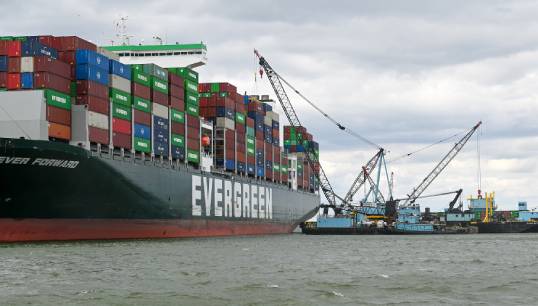Ever Forward investigation report spotlights communication issues
15 December 2022

Following an investigation into the grounding of an Evergreen containership earlier this year, the US Coast Guard (USCG) has warned of the critical importance of communications between bridge teams and pilots.
It has also called for owners and operators to develop policies to combat the risk of a 'fixation on electronic devices' to prevent over-reliance upon a single piece of equipment, and to prohibit the use of mobile phones during safety-critical work.
The 11,850TEU Ever Forward grounded in Chesapeake Bay, just over two hours after leaving the port of Baltimore on 22 March this year. It took 35 days – involving extensive dredging and the removal of more than 500 containers – to refloat the 117,340gt vessel.
The USCG investigation concluded that the grounding was the result of 'the pilot's failure to maintain situational awareness and attention while navigating, and inadequate bridge resource management'.
The report notes that the Hong Kong-flagged ship grounded soon after it failed to make a 180-degree turn at a charted waypoint. Investigators found that the pilot, who was solely relying on his portable pilot unit (PPU) to navigate the ship, had exited the unit's active navigation shortly before the grounding so that he could look at a previous transit.
They also found that the pilot – who has since had his operating licence suspended – had sent two text messages and made five personal or work-related phone calls lasting a total of 60 minutes in the 126 minutes since the ship left port. He was also drafting an email immediately before the grounding, the report adds.
The pilot told investigators he used the PPU because he distrusted the navigational equipment on ships. But the USCG said his 'over-reliance on a single navigational tool' had limited his ability to accurately and quickly make a full appraisal of the situation.
The report also notes that the Chinese third officer had been concerned that the ship had missed the waypoint to turn. However, it adds, instead of warning the pilot directly he had repeated the heading multiple times in an attempt to 'cue' the pilot to the vessel's situation.
As the ship's safety management system stressed, 'the presence of a pilot does not relieve a bridge team of its shared responsibilities for safe navigation', the report points out. 'Despite cultural differences or seniority, the third officer and others on the bridge should have been more assertive to let the pilot know the waypoint had been passed and turn missed.'
The report recommends ship owners and operators to 'ensure and promote crew awareness of policies regarding the duties and obligations of officers on watch for the safety of the ship, even when a pilot is embarked' – highlighting the need for effective communications and continuous information exchange between the pilot, master, and bridge team.
Investigators also discovered that the Ever Forward's ECDIS alarms were silenced at the time of the accident. However, the report noted that 'it is not an uncommon practice for mariners to do this due to the sensitivity of the alarms, which can cause them to sound constantly'.
Tags
More articles
Officer's fall from Arklow Clan cargoship brings flag and port state surveys in question
An investigation into an officer's potentially fatal fall from a general cargoship in the port of Aberdeen has raised concerns over the failure of flag state, port state control and the classification society to spot safety shortcomings.
Enclosed space death highlights need for improved safety signage
Concerns about the lack of standardised signage to warn seafarers about the dangers of enclosed spaces have been raised in a report on the death of an AB in a cargo hold earlier this year.
